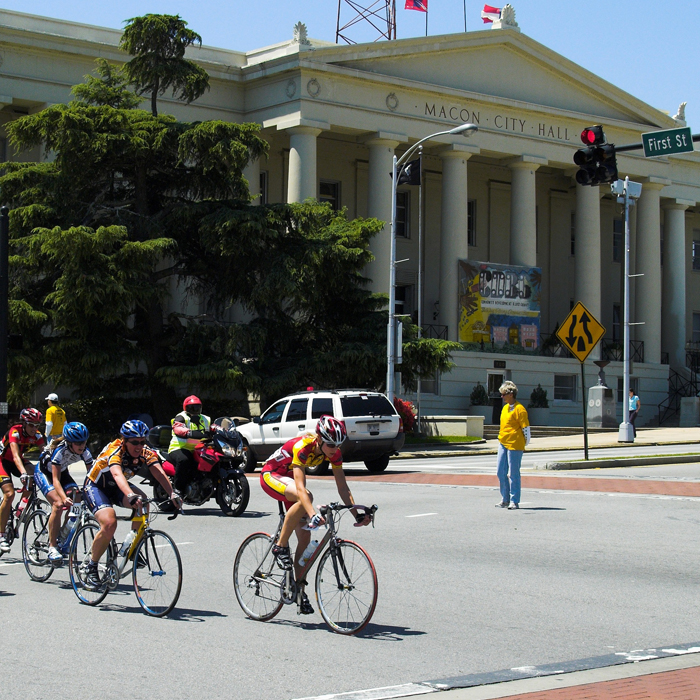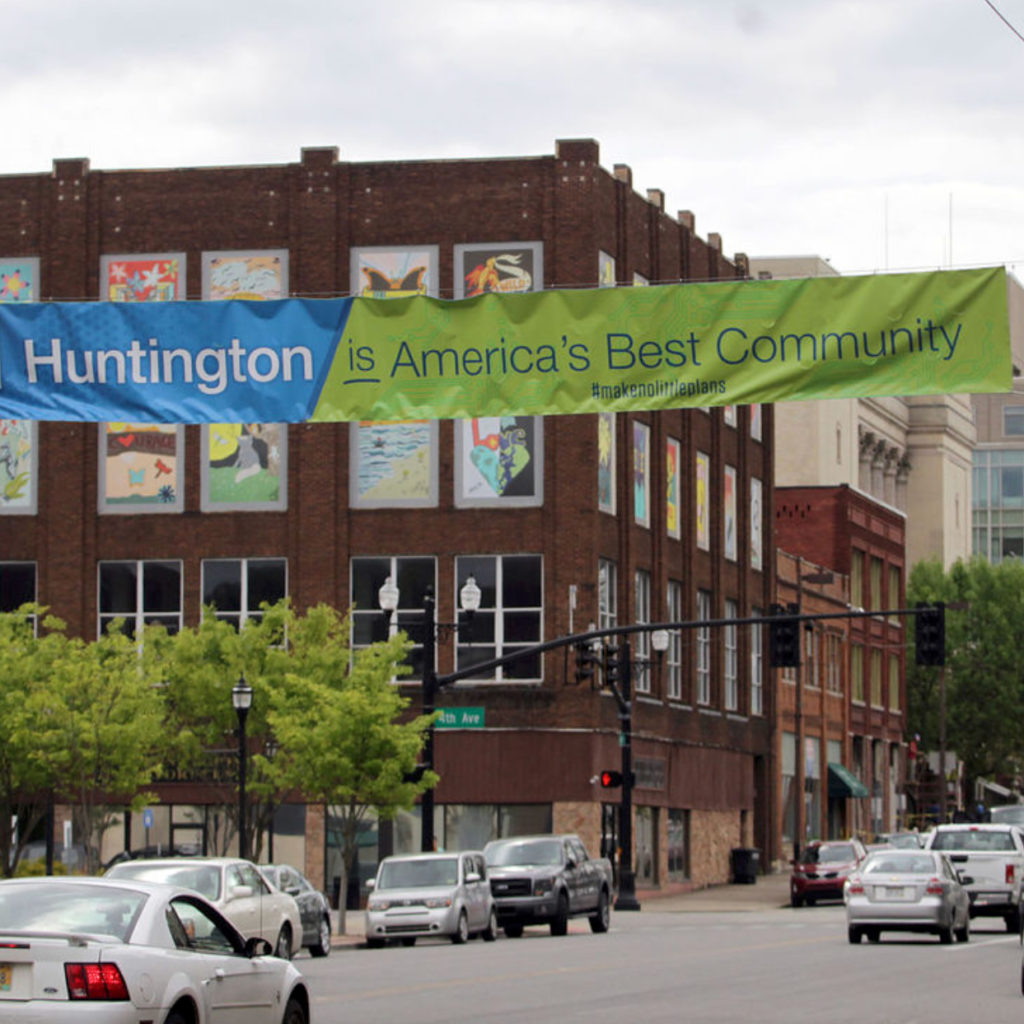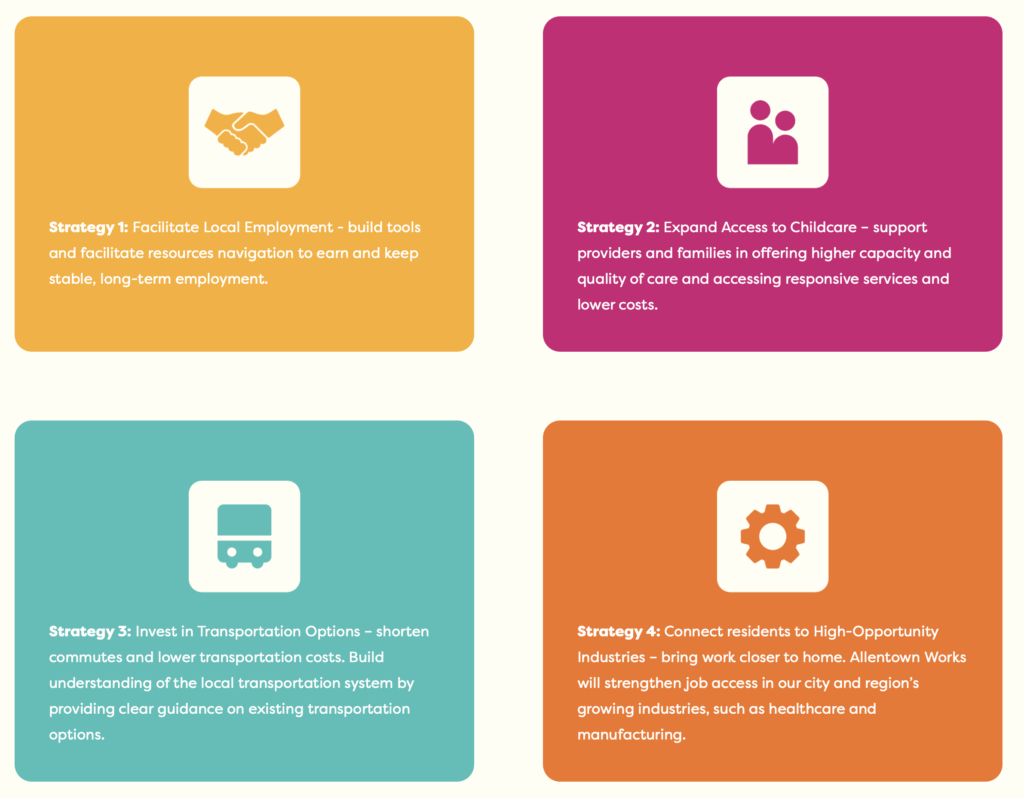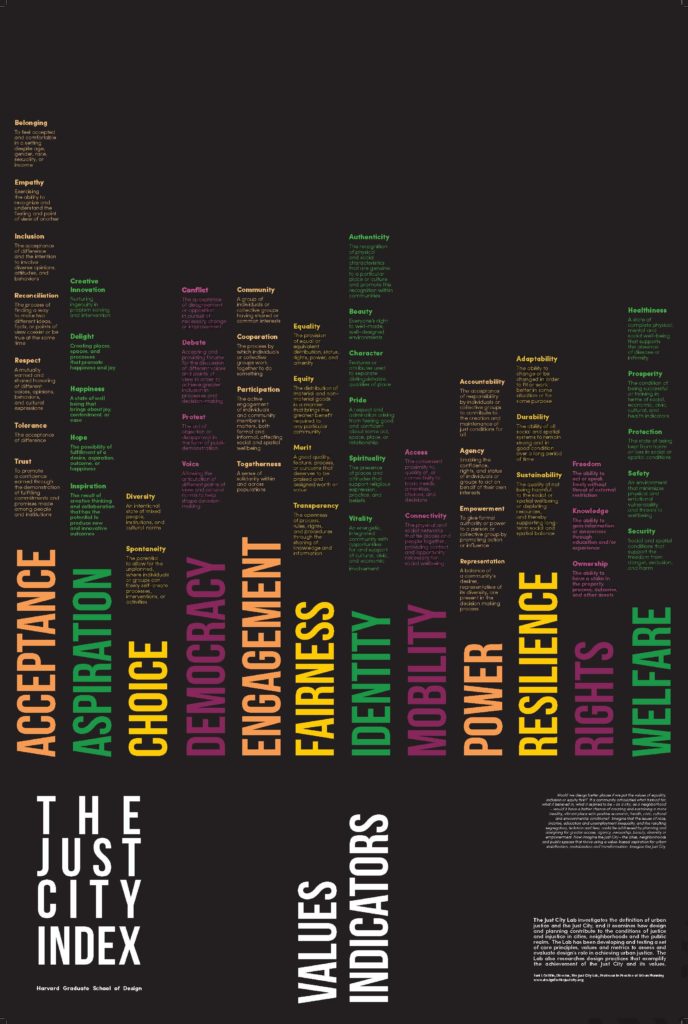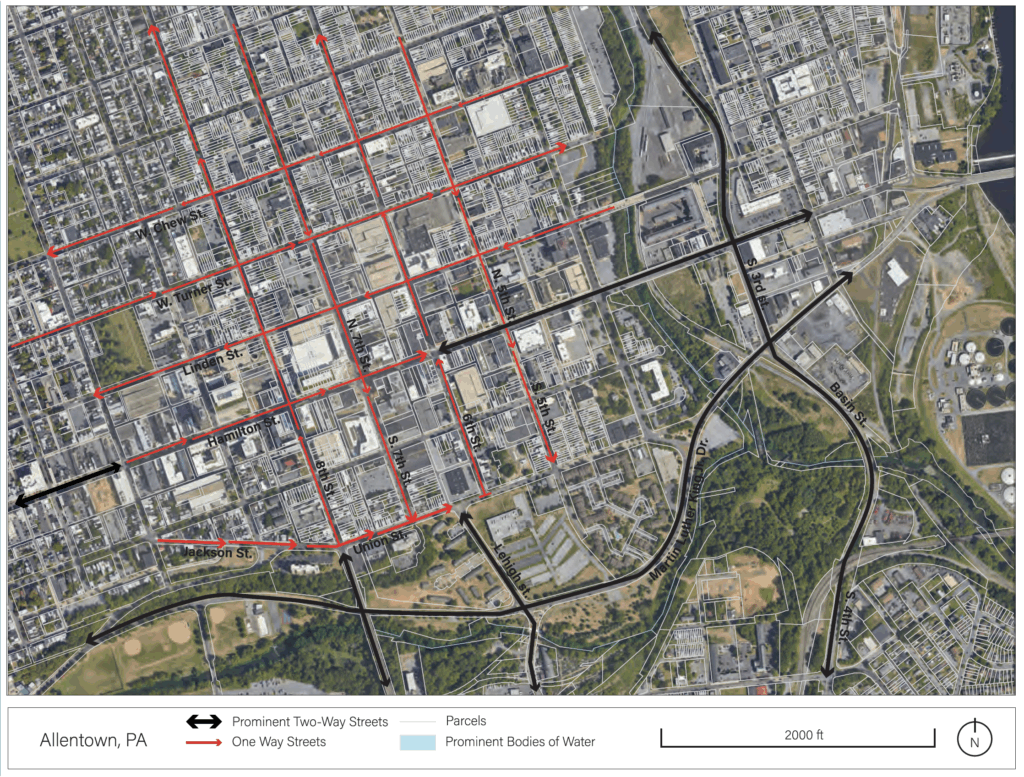What we learned at MICD and at the Just City Mayoral Fellowship continues to affect not just how we plan this project, but the way we plan around our entire city.
Mayor Matt Tuerk (2022 - Present)
MICD Tampa 2023, 2024 Just City Mayoral Fellowship
Introduction
The city of Allentown, PA is in the midst of a renaissance, transitioning from a declining industrial hub to a modern urban center. This city of 126,000 residents has a fast-growing population and a diversified economy, with improved opportunities and quality of life for many residents – but not for all. Over two years of MICD programming, Mayor Matt Tuerk sought advice on improving resident safety and opportunity in every corner of Allentown.
Across two projects – brought to MICD Tampa 2023 and the 2024 Just City Mayoral Fellowship – Mayor Tuerk sought guidance from national design experts to translate his gut feelings about his community’s needs into actionable progress. With reinforcement and recommendations from MICD, Mayor Tuerk and his team went on to launch a street safety action plan, win a $20 million place-based economic development grant, and best of all, infuse clear values and forward-thinking expertise into all facets of his administration’s work.
Challenges
With both projects, Mayor Tuerk sought outside expertise to confirm his intuitions, help uncover hidden assets and opportunities, and identify the best strategies for maximum impact.
Improving Downtown Street Safety: The first project, which Mayor Tuerk brought to a 2023 MICD Institute Session hosted by the University of South Florida in Tampa, focused on street safety challenges in downtown Allentown, where one-way streets and high speeds made for confusing and dangerous conditions. While the city had stated an intention to improve safety and connectivity by restoring many of its one-way streets back to two-way traffic, the challenges of funding and implementing this work loomed large. Mayor Tuerk had “a feeling in my gut that we needed to make design improvements” but was uncertain if his instincts about street design matched best practices in the industry — and if they were, how to channel them into action. In particular, downtown’s 7th Street corridor served as a “main street” destination for the Allentown community and presented a clear test case for the street redesign challenge.
Addressing Systemic Barriers to Economic Opportunity: As that project moved forward, Mayor Tuerk also joined the 2024 cohort of the Just City Mayoral Fellowship, which focused on design strategies for achieving more just and equitable outcomes in the built environment across seven participating cities. Along with two of his key staff — Lucinda Wright (Deputy Director, Parks and Recreation) and Mark Hartney (Deputy Director, Community and Economic Development) — he brought a new project into the fold. The Recompete project focused on the city’s most economically distressed neighborhoods, where residents face systemic barriers to employment such as high poverty rates, low educational attainment, and limited access to transportation and childcare. By applying lessons from the Fellowship’s weekly curriculum and incorporating feedback from the experts gathered at the closing workshop, the Allentown team sought to strengthen their application for a Recompete grant from the U.S. Economic Development Administration, focused on “invest[ing] in economically distressed communities to create and connect people to good jobs.”
Both projects sought to invest in long-overlooked areas and leverage funding sources toward multi-faceted, sustained impacts. Ultimately, both engagements helped Mayor Tuerk and his team articulate the city’s core values in a way that resonated with community members and funders alike.
Impact
“MICD didn’t just give us third-party validation to use for potential funders or outside stakeholders — it also helped ensure that internally, city leadership is aligned about the importance and direction of this project to move the needle.”
Improving Downtown Street Safety: The experts at the 2023 Institute Session reaffirmed the mayor’s intuition that redesigning downtown’s streets as places for people, not just cars, would achieve so much more than just making critical safety improvements – it would benefit the community economically and socially for years to come. Nuanced advice, continued through MICD Alumni Advising, focused on where to target early interventions and how to conduct robust community engagement for maximum impact. These recommendations have continued to influence the city’s work as they went on to acquire a USDOT Safe Streets for All grant, develop a citywide street safety action plan, and designate this project area as a high-injury network in need of critical attention.
“It galvanized our city around being able to think about 7th Street differently. Now, as we continue to build toward infrastructure improvements along this corridor, we have a solid plan in place that defines our guiding principles for design and implementation for this critically important roadway. In a time of funding uncertainty, this framework – and having all these experts in our corner – really helps ensure this work will get done.”
Addressing Systemic Barriers to Economic Opportunity: Similarly, the Just City Mayoral Fellowship helped the Allentown team sharpen their narrative for the Recompete grant application, identify geographic areas to target the most effective use of resources, and reimagine the community engagement process as one with meaningful community input and empowerment. One key piece of feedback from the Fellowship’s experts was to rename the project, stepping away from the “Recompete” grant name and toward something more targeted. Now called Allentown Works, the project has a dedicated website with clear, approachable messaging about “build[ing] a future where everyone can thrive and advance together,” while keeping a strong focus on place-based efforts and forward-thinking design solutions.
Another recommendation was to focus on a particular corridor as a “neighborhood main street,” with targeted improvements geared toward improving physical as well as social infrastructure. Through an initiative called Allentown Shows Up, Mayor Tuerk and leaders from multiple city departments spend an extended period of time in one corner of the city, offering food and speaking with residents while repairing surface-level infrastructure issues. More than just quick fixes, though, these engagements offer granular insight about a neighborhood’s needs and where larger investments can have a maximum impact.
“Shortly after the Fellowship, we secured the $20M implementation grant from the EDA. We were working on the grant application throughout that semester, and a lot of what we put forward in the application mirrored the lessons learned from Fellowship speakers and peer cities. At the core, we are working to lower the barriers to people for participating in the economy and giving them opportunities to get ahead. It’s about meeting people where they are and engaging them as meaningful participants in the planning and design processes.”
Beyond the Fellowship, a poster displaying the Just City Index still adorns the walls in the mayor’s office, and the team refers back to their manifesto of action for this project often. “What we learned at MICD and at the Just City Mayoral Fellowship continues to affect not just how we plan this project, but the way we plan around our entire city. My staff who went through the program with me have moved into other departments, where they are bringing these values and concepts into the way they make capital investments, deliver programs, and involve residents every step of the way.”
Lessons for City Leaders
- Seek out expert opinions: Mayors are responsible for leading on an enormous range of topics. Seek out second opinions from experts in the fields involved to validate your gut instincts and provide expertise that guides you toward the best paths forward.
- Invest in true community engagement: Meaningfully involving residents in planning and design processes is key to sustaining places that age well, maximize public investment, and contribute to community well-being. Greater buy-in also means fewer plans that sit on the shelf; revisit past plans and designs done without sufficient resident input to create greater opportunities.
- Tell the real story: A compelling, community-driven narrative with a clear name helps build resident buy-in and make the case for potential funders.
- Stand by your values: Take the time to articulate the values that drive your work — that inspired you to run for office or work in city government in the first place — and revisit them often as the work moves forward.
View this post on Instagram


